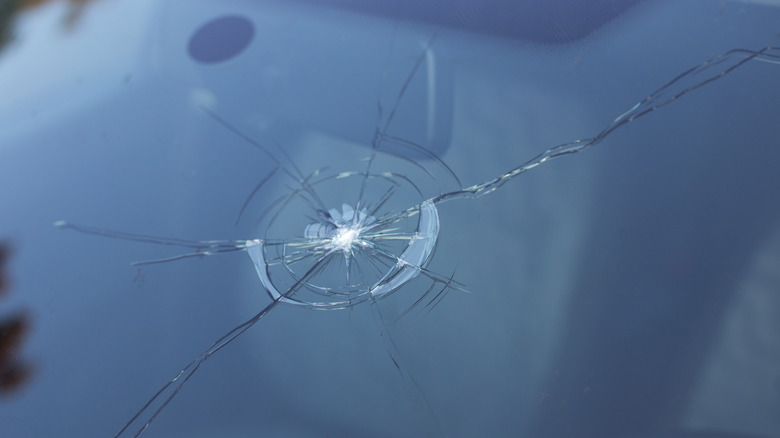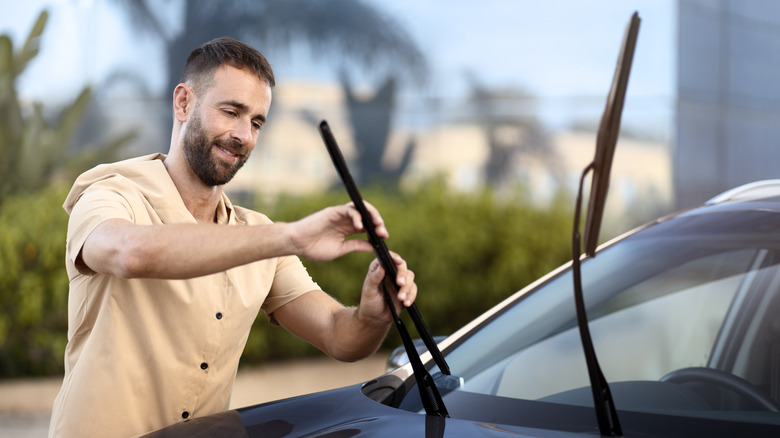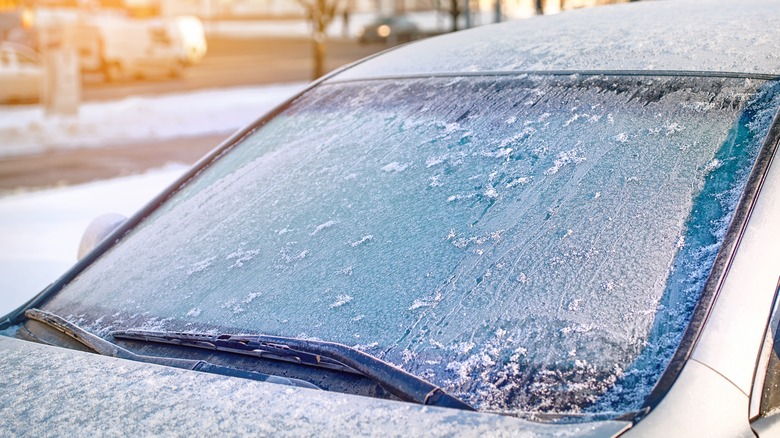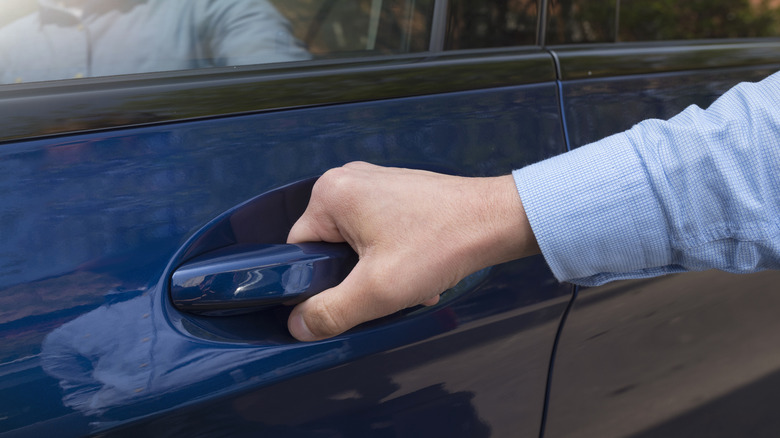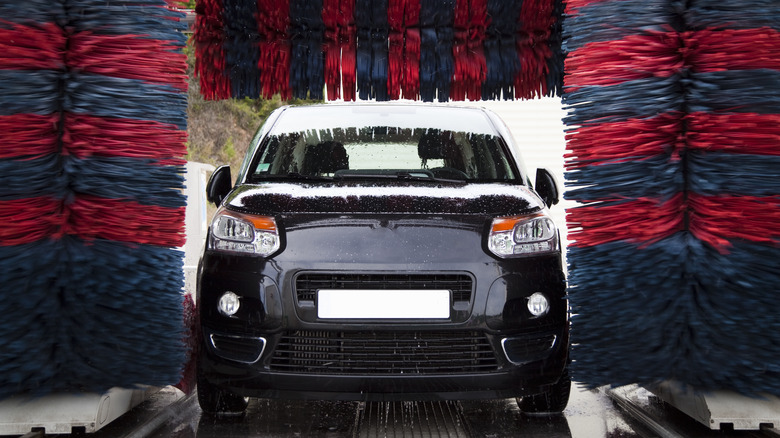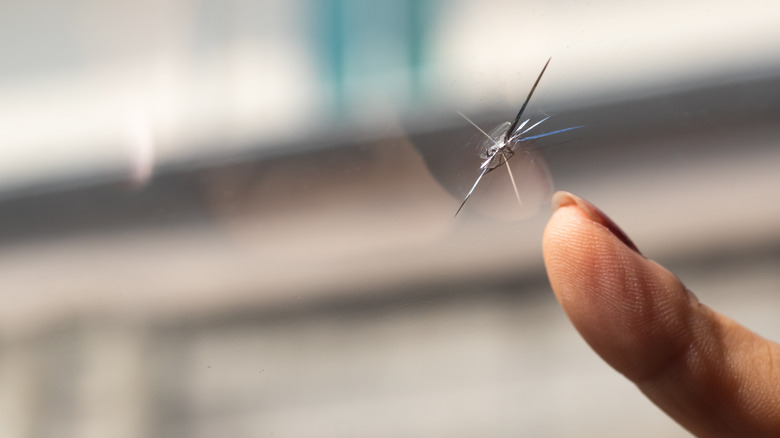Avoid Chips And Cracks: 6 Tips To Protect Your Windshield
It's hard to say that any one portion of your car is more important than the other, but it's safe to say that your car windshield is certainly one of the most crucial as a driver. Without it, there's no way to see the road ahead of you or spot potential signs and hazards. Given the exposure that your car has to the elements on a regular basis, your windshield is made to take a fair amount of abuse. At the end of the day, however, it's still glass, meaning that it's still prone to chips and cracks under the wrong situation.
You may have spotted a small split or two on your car's windshield and not have given it much thought. Not much worse than a scratch on your door, right? Well you may want to rethink that sentiment. A split may seem insignificant, but ignoring it leaves your windshield open to even greater damage. As it continues being exposed to the weather, road vibrations, and debris, that split or crack will expand. Not only will it create a pretty deep dent in your bank account to get fixed, but leaves your vision compromised and places you at higher risk of getting into a car accident.
For the safety of yourself and others on the road, it's important to give your windshield the same amount of TLC that you would the rest of your vehicle. By paying close attention to the condition of your windshield, you'll save yourself endless headaches in the long run.
Regularly replace your windshield wipers
Your wipers are the first line of defense in protecting your windshield from harm. When properly working, they effortlessly wipe away excess water, dirt, grime, and other debris that would otherwise keep you from seeing the road. As a result, ensuring that they're maintained is a key step to protecting your windshield from damage.
Like other components of your car, you should get your windshield wipers replaced regularly. As time goes on, the rubber coating on your windshield wipers will wear out and lose shape, making it far less effective at cleaning your windshield, creating unsightly streaks that will make seeing clearly much harder. On top of that, poor quality blades can apply uneven pressure, which, when paired with other environmental elements, can weaken the glass and increase the chances of your windshield cracking.
It's a good idea to get your windshield wipers replaced at least once a year as a general rule, although this may increase depending on the area you live in and how often you find yourself using them. As soon as you notice your windshield wipers are wearing out, you should get them replaced. Just as important as getting new ones is ensuring that the wipers you get are the correct size and fit for your vehicle to avoid damage to your windshield. Depending on your confidence level, you can replace your windshield wipers on your own, otherwise get the job done professionally.
Watch for extreme temperature changes
If you've ever taken baked food on a glass pan out of the oven and had it suddenly shatter once you place it on the counter, it's an experience that's as frustrating as it might be confusing. The reality is that a sudden change in temperature is no good for glass. While this can be annoying when it happens to a glass pan where you made your chicken, it can downright ruin your day when your car windshield is affected.
Extreme temperatures can put stress on glass, with cold causing glass to shrink and heat causing it to expand. If there are minor or near-invisible cracks present on your windshield, they will only worsen as the weather gets more extreme. While it may not show signs of damage right away during regular winters and summers, windshields that experience extreme temperature fluctuations are in bigger trouble. Much like taking a hot glass pan or plate out of an oven too soon, suddenly going from hot to cold can greatly accelerate the cracking of your windshield
If you live in an area that experiences drastic changes in temperature be sure to check on your windshield regularly. Any signs of chipping or cracking in these circumstances should be addressed immediately. Likewise, avoid putting your heat or A/C on full blast when the weather outside is extreme, especially if your windshield has any damage. Instead put it on a lower setting and give your car more time to reach the ideal temperature before getting in.
Don't slam your car door
Our cars can provide an unusual form of stress relief. After a long, frustrating day, you may find yourself driving faster or pulling the gears more aggressively without even realizing it. And when you exit the car, you close the door with an unforgiving slam. While it's understandable that you'd want to let out your frustration out, your car is perhaps one of the last place you should use as an outlet, especially if you care about the condition of your windshield.
Slamming the car door brings about vibrations that go through the vehicle and directly affects the glass. Constantly slamming your car door will wear out your windshield over time and create cracks. As you can imagine, this process is severely accelerated if your windshield is already damaged. Simply put, be mindful of the amount of force you use when closing your car door. Likewise, anyone else who regularly uses your car should also be informed of the consequences that can come with ignoring how heavy handed they are with the car door.
There are also some simple maintenance habits you can practice to ensure your car doors are able to withstand some level of impact. Lubricating the hinges of your car door can aid in helping it close more gently. You should also keep an eye on the rubber seals that surround your door. These are crucial to ensuring that something can absorb the impact of a door being shut, so if they seem worn out, you should have them looked at.
Invest in good cleaning and protection products
Just as what we put in our bodies affects our health and well-being, what we apply in and on to our cars will affect their well-being and longevity. Your windshield may not seem that complicated to find cleaning products for, especially when compared to other components of your car. However, given the crucial functionality of your windshield, it couldn't be more important to find quality products to use on it. Using poor quality materials on your windshield can cause a number of problems that can lead to cracking and similar damage.
Any cleaning product that contains ammonia should be avoided at all costs. While effective, these cleaners can have the adverse effect of cutting away at the protective film that lines your windshield. Doing so makes it easier to scratch and buff, leaving it more at risk to crack over time. On top of this, using ammonia cleaners on your windshield interior can also prove harmful, as breathing in these chemicals can be hazardous to your health.
Instead, opt for auto glass specific cleaners. These are formulated with the proper pH balance to be used on car glass effectively without causing long-lasting damage. Be sure to also avoid using towels, rags, or old shirts to clean your windshield, as these can cause streaking and scratches. Use microfiber cloths instead which are better at absorbing debris without causing harm. It's also worth investing in windshield protection film in order to defend it from cracks and UV rays.
Don't wash your car at an automatic car wash
Time is tight for a lot of us. As a result, it can be tricky to make time for tasks such as washing your car by hand. As tempting as it might be to take a quick ride through that two-minute car wash down the street, it's for the best that you avoid these locations at all costs if you value the life of your windshield.
As one of the most common mistakes car owners make when washing their cars, it's easy to see how time-strapped individuals would be drawn to the convenience offered by automatic car washes. However, that's practically the only benefit they provide. Auto car washes often use harsh chemicals, abrasive brushes, and an excessive amount of pressure that, as you can imagine, are bad news for your windshield glass. They can cause additional damage to sections such as your windshield wipers and mirrors, while also harming your paint job and even potentially misaligning your tires. Worst of all, they're not even all that effective at cleaning, often abandoning portions of your car and leaving behind ugly hard water stains.
The solution here is to simply wash your car by hand. While there are services that can perform this, it's best to make the time to wash your car on your own in order to ensure your vehicle is being handled to the way you know how to handle it. Be sure to avoid using pressure washers on your windshield, as this too can cause cracking and remove protective elements.
Get cracks taken care of immediately
Of course, sometimes even the best preventative measures aren't enough to stop a crack. Being exposed to so much on a regular basis will more than likely take its eventual toll on your windshield and all you can do is to take as good enough care of it to prolong that outcome. The important thing to keep in mind is that if you do notice that your windshield is damaged you'll need to take care of it right away.
As stated at the top of this article, it's easy to ignore a minor glass crack on your windshield. However, that assumption can end up costing you pretty severely in the long run. Even the smallest speck of damage to your windshield can be the catalyst for greater damage to come, as further exposure to the elements and different driving conditions will only add more pressure to the glass and make things worse.
A broken windshield can cost you pretty severely, and we aren't kidding. While the price for replacing a windshield depends on your vehicle make, location, and labor costs, you're looking at paying between $300 and $1,000 for extensive windshield repairs. On the flip side, chips and cracks spotted early on can cost between $50 and $70 to care for professionally or can even be done on your own in some cases. At the end of the day, while there's no way to fully prevent a cracked windshield, acting early in both caring for your windshield and addressing problems when they arise will keep your head way above water.
